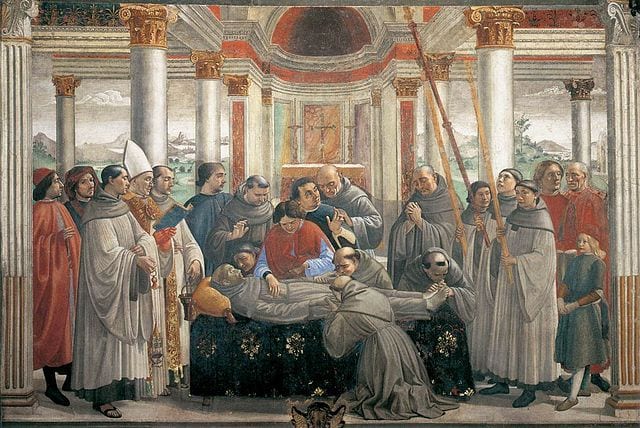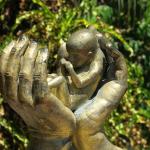
“Be praised, my Lord, through our Sister Bodily Death,
from whose embrace no living person can escape.
Woe to those who die in mortal sin!
Happy those she finds doing your most holy will.
The second death can do no harm to them.”
Autumn begins, officially, in September. But here in the ugly neighborhood of LaBelle, in the derelict steel mill town of Steubenville, in the place where the Rust Belt collides with Northern Appalachia, in a country they tell me is tearing apart, on a planet that they say is burning to death– here, the Autumn weather comes about the end of the first week of October.
Tonight is the night the weather changes: the last day of agonizing heat predicted this week, this month, this year. When I awoke this morning, there was sun pouring through the cracks in the blinds; then it clouded over, and now the day is dying and the heat with it.
When I went for a walk, the air was hot, but the breeze blowing over me was cool.
The heat will continue to die all night, and in the morning it will be cold.
When Saint Francis was dying, on the third night of October, that is tonight, he asked to be laid on the ground. He asked his followers to read from the Gospel according to John, and they read:
Now before the feast of the Passover, when Jesus knew that his hour had come to depart out of this world to the Father, having loved his own who were in the world, he loved them to the end. And during supper, when the devil had already put it into the heart of Judas Iscariot, Simon’s son, to betray him, Jesus, knowing that the Father had given all things into his hands, and that he had come from God and was going to God, rose from supper, laid aside his garments, and girded himself with a towel. Then he poured water into a basin, and began to wash the disciples’ feet, and to wipe them with the towel with which he was girded. He came to Simon Peter; and Peter said to him, “Lord, do you wash my feet?” Jesus answered him, “What I am doing you do not know now, but afterward you will understand.” Peter said to him, “You shall never wash my feet.” Jesus answered him, “If I do not wash you, you have no part in me.” Simon Peter said to him, “Lord, not my feet only but also my hands and my head!” Jesus said to him, “He who has bathed does not need to wash, except for his feet, but he is clean all over; and you are clean, but not all of you.” For he knew who was to betray him; that was why he said, “You are not all clean.”
Have I washed anybody’s feet this year?
In all the days since the last time it was October, have I taken off my outer garment and put on a towel? Have I even once gotten down on hands and knees and decreased so that others might increase? Have I made myself dirty and disreputable, taking the form of a slave, in the service of another, as the Gospel demands of me?
When he had washed their feet, and taken his garments, and resumed his place, he said to them, “Do you know what I have done to you? You call me Teacher and Lord; and you are right, for so I am. If I then, your Lord and Teacher, have washed your feet, you also ought to wash one another’s feet. For I have given you an example, that you also should do as I have done to you. Truly, truly, I say to you, a servant is not greater than his master; nor is he who is sent greater than he who sent him. If you know these things, blessed are you if you do them. I am not speaking of you all; I know whom I have chosen; it is that the scripture may be fulfilled, ‘He who ate my bread has lifted his heel against me.’ I tell you this now, before it takes place, that when it does take place you may believe that I am he. Truly, truly, I say to you, he who receives any one whom I send receives me; and he who receives me receives him who sent me.”
Have I received Him, and the One Who sent Him?
I walked down the alleys, where the wild mint and lemon balm is still fragrant and lush, choking the walkway. The sycamores towering above them are already asleep for the year. The Rose of Sharon is drying out, but you can still find blossoms from place to place. The crabapples are green but faded, and I saw the first red leaves here and there. The asters are vibrant, and will be for a little longer. By the time the asters die, the trees will have all gone gold and scarlet. It will seem as if LaBelle is on fire.
When the fire consumes the whole world, what will become of us?
When Saint Francis was dying, he intoned a maskil of David, the psalm David composed while hiding in a cave, afraid for his life. Francis was not afraid for his life, but still he prayed:
I cry with my voice to the Lord,
with my voice I make supplication to the Lord,
I pour out my complaint before him,
I tell my trouble before him.
When my spirit is faint,
thou knowest my way!
In the path where I walk
they have hidden a trap for me.
I look to the right and watch,
but there is none who takes notice of me;
no refuge remains to me,
no man cares for me.
I cry to thee, O Lord;
I say, Thou art my refuge,
my portion in the land of the living.
Give heed to my cry;
for I am brought very low!
Deliver me from my persecutors;
for they are too strong for me!
Bring me out of prison,
that I may give thanks to thy name!
The righteous will surround me;
for thou wilt deal bountifully with me.
I walked under a dogwood tree that had already turned, the leaves and berries both. It was just the color of a ruby; the name of that color is pigeon’s blood.
The pigeons will stay in LaBelle all winter. The cardinals in their pigeon’s blood plumage will stay all winter, and when we see them perched on a winter tree we’ll be taken by surprise. The starlings that murmurate in dead trees by the hundred will stay. The fat brown sparrows will stay. Other birds are moving south, and soon they will be gone.
The came when LaBelle was green, and now that it’s dry, they are going away.
They say that birds came to sing to Saint Francis as he died.
There are statues of Saint Francis all over LaBelle: bird baths and feeders cast in the shape of the poor man who talked to animals; the saintly madman who once stripped naked in front of the bishop; the beggar who called the sun his brother; the spoiled, wealthy son of a rich man, who embraced a leper and went off to rebuild a Church that was crumbling.
She is crumbling again, today.
She is always alive, always new, always dying, always crumbling, always rising again.
I walked through the loud, crumbling leaves of a sycamore, and admired the bark that peels off naturally in big sheets, until the tree itself looks like a leper.
When Saint Francis was dying, he told his brothers, “I have done what is mine to do. May Christ now teach you what is yours to do.”
He asked to be laid naked on the ground.
And when it was time to transition from life to immortal life, he said, “Welcome, my sister, Death.”
This was the last hot day. Tomorrow morning, it will be cold.
Death is terrible, but not in the way that you think.
(image via wikimedia commons)
Steel Magnificat runs almost entirely on tips. To tip the author, visit our donate page.













